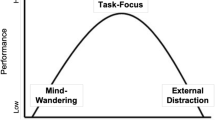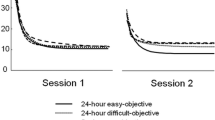Abstract
The generalizability of prior laboratory findings and Carver's (1979) model of self-regulation were tested by examining the effects of differential self-monitoring in golf. Subjects were 109 unskilled (Mhandicap = 30) volunteers who first received instructions on the components of the effective golf swing and then participated in three experimental sessions. All subjects practiced their golf swings during each session by hitting 6 Wiffle golf balls. Stratified random assignment determined whether a subject positively self-monitored (recorded effective execution of components), neutrally self-monitored (recorded recognition of components), or did not self-monitor (control). To induce two levels of self-focused attention, subjects were assigned randomly either to obtain feedback by observing videotapes of their performance or not to obtain videotaped feedback during the intervention. Thus, self-monitoring occurred either during the review of videotapes (feedback groups) or mentally (no-feedback groups). Measures included ratings by observers of change from baseline in the golf swing (quality, consistency, missed shots) and self-reported change in relevant attitudes. As expected, positive self-monitors improved significantly more than neutral self-monitors and controls, respectively, on most measures of performance and attitudes. In accord with Carver's model, the use of videotaped feedback (i.e., heightened self-focused attention) slightly exaggerated these group differences. The potency of differential self-monitoring and the parallels between the effects of attention and experience are discussed.
Similar content being viewed by others
References
Abrams, D. B., & Wilson, G. T. (1979). Self-monitoring and reactivity in the modification of cigarette smoking.Journal of Consulting and Clinical Psychology, 47 243–251.
Broden, M., Hall, R. V., & Mitts, B. (1971). The effect of self-recording on the classroom behavior of two eighth grade students.Journal of Applied Behavior Analysis, 4 191–199.
Carver, C. S. (1979). S. A cybernetic model of self-attention processes.Journal of Personality and Social Psychology, 37 1251–1281.
Carver, C. S., Blaney, P. H., & Scheier, M. F. (1979a). Focus of attention, chronic expectancy, and responses to a feared stimulus.Journal of Personality and Social Psychology, 37 1186–1195.
Carver, C. S., Blaney, P. H., & Scheier, M. F. (1979b). Reassertion and giving up: The interaction role of self-directed attention and outcome expectancy.Journal of Personality and Social Psychology, 37 1859–1871.
Carver, C. S., & Scheier, M. F. (1981).Attention and self-regulation: A control-theory approach to human behavior. New York: Springer-Verlag.
Clark, S. V., & Arkowitz, H. (1975). Social anxiety and self-evaluation of interpersonal performance.Psychological Reports, 13 321–331.
Diener, C. I., & Dweck, C. S. (1978). An analysis of learned helplessness; continuous changes in performance, strategy, and achievement cognitions following failure.Journal of Personality and Social Psychology, 36 451–462.
Ewart, C. K. (1978). Self-observation in natural environments: Reactive effects of behavior desireability and goal-setting.Cognitive Therapy and Research, 2 39–56.
Gottman, J. M., & McFall, R. M. (1972). Self-monitoring effects in a program for high school dropouts: A time series analysis.Journal of Consulting and Clinical Psychology, 39 273–281.
Holroyd, K., Westbrook, T., Wolf, M., & Badhorn, E. (1978). Performance, cognition, and physiological responding in test anxiety.Journal of Abnormal Psychology, 87 442–451.
Johnston, E. J. (1982).The instructional use of videotape: Making “a good thing” better; the effects of self-monitoring programs and videotape feedback on performance, success and failure attribution, and motivation (Doctoral dissertation, University of Rochester, 1981).Dissertation Abstracts International, 42 2132.
Kanfer, F. H. (1971). The maintenance of behavior by self-generated stimuli and reinforcement. In A. Jacobs & L. B. Sachs (Eds.),The psychology of private events (pp. 39–59). New York: Academic Press.
Kanfer, F. H., & Hagerman, S. (1981). The role of self-regulation. In L. P. Rehm (Ed.),Behavior therapy for depression: Present status and future directions (pp. 143–180). New York: Academic Press.
Kantorowitz, D. A., Walters, J., & Pezdek, K. (1978). Positive versus negative self-monitoring in the self-control of smoking.Journal of Consulting and Clinical Psychology, 46 1148–1150.
Kirschenbaum, D. S. (1984). Self-regulation and sport psychology: Nurturing an emerging symbiosis.Journal of Sport Psychology.
Kirschenbaum, D. S., & Bale, R. M. (1980). Cognitive behavior skills in golf: Brain power golf. In R. M. Suinn (Ed.),Psychology in sports: Methods and applications (pp. 334–343). Minneapolis: Burgess.
Kirschenbaum, D. S., & Flanery, R. C. (1983). Behavioral contracting: Outcomes and elements. In M. Hersen, P. Eisler, & P. M. Miller (Eds.),Progress in behavior modificaton (Vol. 15, pp. 217–275). New York: Academic Press.
Kirschenbaum, D. S., & Flanery, R. C. (1984). Toward a psychology of behavioral contracting.Clinical Psychology Review, 4 597–618.
Kirschenbaum, D. S., & Karoly, P. (1977). When self-regulation fails: Tests of some preliminary hypotheses.Journal of Consulting and Clinical Psychology, 45 1116–1125.
Kirschenbaum, D. S., Ordman, A. M., Tomarken, A. J., & Holtzbauer, R. (1982). Effects of differential self-monitoring and level of mastery on sports performance: Brain power bowling.Cognitive Therapy and Research, 6 335–342.
Kirschenbaum, D. S., & Tomarken, A. J. (1982). On facing the generalization problem: The study of self-regulatory failure. In R. C. Kendall (Ed.),Advances in cognitive-behavioral research and therapy (Vol. 1., pp 121–200). New York: Academic Press.
Kirschenbaum, D. S., Tomarken, A. J., & Humphrey, L. L. (1984). Affect and adult self-regulation.Journal of Personality and Social Psychology.
Kirschenbaum, D. S., Wittrock, D. A., Smith R. J., & Monson, W. (1984). Criticism inoculation training: Concept in search of strategy.Journal of Sport Psychology, 6 77–93.
Kuhl, J. Volitional aspects of achievement motivation and learned helplessness: Toward a comprehensive theory of action control. In B. A. Maher (Ed.),Progress in experimental personality research (Vol. 13). New York: Academic Press.
Lazarus, R. S., & Eriksen, C. W. (1952). Effects of failure stress upon skilled performance.Journal of Experimental Psychology, 43 100–105.
Mahoney, M. (1977 December). Cognitive skills and athletic performance. (Chair).Sports psychology: Background, issues, and current research. A symposium presented at the meeting of the Association for Advancement in Behavior Therapy, Atlanta.
Martin, G. L., & Hrycaiko, D. C. (1983). (Eds.).Behavior modification and coaching: Principles, procedures, and research. Springfield, IL: CC Thomas.
McDonald, P. J. (1980). Reactions to objective self-awareness.Journal of Research in Personality, 14 250–260.
McFall, R. M., & Hammen, C. L. (1971). Motivation, structure, and self-monitoring: The role of nonspecific factors in smoking reduction.Journal of Consulting and Clinical Psychology, 37 80–86.
Meyers, A. W., Schleser, R., Cooke, C. J., & Cuvillier, C. (1979). Cognitive contributions to the development of gymnastic skills.Cognitive Therapy and Research, 3 75–85.
Moore, B., Underwood, B., Heberlein, P., Doyle, L., & Litzie, K. (1979). Generalization of feedback about performance.Cognitive Therapy and Research, 3 371–380.
Nicklaus, J. (1974).Golf my way. New York: Simon and Schuster.
Postman, L., & Brown, D. R. (1952). The perceptual consequences of success and failure.Journal of Abnormal and Social Psychology, 47 213–221.
Richards, C. S., Anderson, D. C., & Baker, R. B. (1978). The role of information feedback in the relative reactivity of self-monitoring and external observation.Behavior Therapy, 9 687.
Rijsman, J. B. (1974). Factors in social comparison of performance influencing actual performance.European Journal of Social Psychology, 4 279–311.
Silverman, I. (1964). Self-esteem and differential responsiveness to success and failure.Journal of Abnormal and Social Psychology, 69 115–119.
Tomarken, A. J., & Kirschenbaum, D. S. (1982). Self-regulatory failure: Accentuate the positive?Journal of Personality and Social Psychology, 43 584–597.
Wade, T. C. (1974). Relative effects on performance and motivation of self-monitoring correct and incorrect responses.Journal of Experimental Psychology, 77 245–248.
Weinberg, R. S., Gould, D., & Jackson, A. (1980). Cognition and motor performance: Effect of psyching-up strategies on three motor tasks.Cognitive Therapy and Research, 4 239–245.
Weiner, B. (1972).Theories of motivation: From mechanism to cognition. Chicago: Rand McNally.
Weiner, B., & Schneider, K. (1971). Drive versus cognitive theory: A reply to Boor and Harmon.Journal of Personality and Social Psychology, 18 258–262.
Author information
Authors and Affiliations
Additional information
The authors gratefully acknowledge the contributions of the following individuals to various aspects of the present research: Miron Zuckerman, Don Green, Kris Sorg, Latta Lea Gold Club, and the Irondequoit Town Recreation Department.
Rights and permissions
About this article
Cite this article
Johnston-O'Connor, E.J., Kirschenbaum, D.S. Something succeeds like success: Positive self-monitoring for unskilled golfers. Cogn Ther Res 10, 123–136 (1986). https://doi.org/10.1007/BF01173388
Issue Date:
DOI: https://doi.org/10.1007/BF01173388




